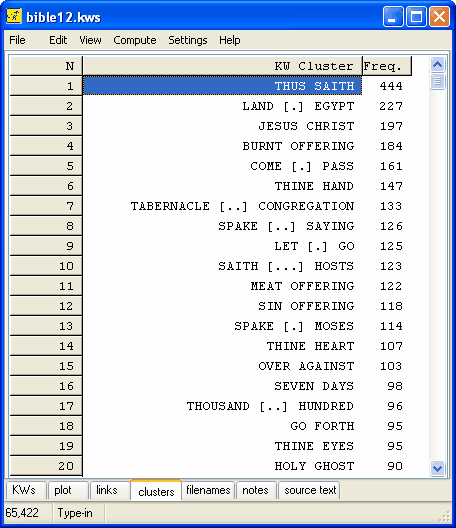7 Things You Should Not Do With SEO This Week Episode 186 - Keyword Clustering
Not known Facts About Keyword Clustering
Table of ContentsAll about Keyword ClusteringSome Known Factual Statements About Topic Cluster The 3-Minute Rule for Keyword ClusteringSee This Report about Keyword ClusteringThe Main Principles Of Keyword Clustering
Source: Moz However, in times where you require to develop material for readers, not browse spiders, the search engine has become far better at comprehending context, synonyms, and associated topics. As a consequence, it will rank pages for whole hosts of keywords, not simply single expressions. Because this is occurring anyway, why not benefit from it and produce content precisely with that goal in mind? That way, you increase your opportunities of showing up for numerous search queries, suggesting more chances individuals will click on your short articles and concern your site.
 More About Keyword Clustering
More About Keyword Clustering
No worries young padawan, that is precisely what we will go through for the rest of the post. (Is padawan still a relevant cultural reference in 2019 or am I getting old?) As you will see below, there are numerous ways to do keyword clustering. However, what they all have in common is that you first need a selection of essential expressions to develop clusters from.
For those who do not wish to read an entire post, here are a number of exceptional sources to obtain this kind of info from: Conceptualizing keywords based on your website, audience, and industry Competitor analysis and marketing research SEO tools (e. g. AnswerThePublic, Keywordtool. io) Info in Google Browse Console and Google Analytics The important thing at this phase is to go for quantity not quality.
Excitement About Keyword Clustering
How much is enough? Nevertheless many you can find, however several hundred to a thousand is a great starting point. It can also be a lot more. Your objective is to make a total sweep so you never need to do it again. As soon as you are satisfied, it's time to start organizing them into clusters that make sense.
https://www.youtube.com/embed/kjrJFE7LUKA
One of the methods to go from a long list of keywords to topical clusters is to do develop them by hand. By that, I don't recommend that you go through several thousand keyword possibilities one by one and classify them by hand. Rather, you can do some old-school SEO work and utilize a spreadsheet.
It includes the following steps: Running your keyword list through a word and phrase frequency counter to discover the most-used search parts Finding out the most crucial terms and expressions to develop topical groups Assigning your search expressions by topic to produce keyword clusters The entire thing includes a whole lot of spreadsheet hoax and formulas.
4 Simple Techniques For Topic Cluster
While the above is fantastic to get your hands dirty and really understand the process, it's not the only possibility. There are a variety of tools out there that can group your keywords immediately. All you https://en.search.wordpress.com/?src=organic&q=search engine optimization need to do is feed them your list and the rest occurs by itself.
It provides you 30 free searches initially and one daily when you have utilized up your quota. Simply copy and paste your list of keywords in there and after that struck the button on the bottom right. You will wind up with something like this. In my test, the outcomes were respectable.
You can likewise eliminate any group from the outcomes that don't make sense by clicking the X. That method, you end up only with those that are useful. Plus, the tool will email you the full list if you want. Obviously, where there are complimentary tools, there are also paid versions.
Getting My Keyword Cluster To Work
Here are a number of fantastic options: Topvisor This is an SEO suite for all sorts of functions. It includes a rank tracker, keyword research, auditing tool and a lot of other functions. The keyword clustering tool provides a totally free trial and uses Google's leading outcomes to find related keywords based upon the URLs they appear in.
8 per 100 keywords. WordStream The above-mentioned WordStream share likewise has more to offer than the totally free keyword clustering tool. They mainly focus on running Pay Per Click campaigns and aid with analysis and optimization. If that is your thing, rates begins at $20/month. SpySerp SpySerp is a keyword rank tracker that works both for Google and Bing.
 Content Cluster Can Be Fun For Anyone
Content Cluster Can Be Fun For Anyone
After that, they http://query.nytimes.com/search/sitesearch/?action=click&contentCollection®ion=TopBar&WT.nav=searchWidget&module=SearchSubmit&pgtype=Homepage#/search engine optimization have different plans that begin at $19/month. Serpstat This choice has a keyword clustering tool that uses real-life information from Google for grouping keyphrases. Aside from that, you get keyword research study, search analytics, rank tracking, website auditing and a lot more. You can start for $19 a month for an individual plan.
Content Cluster for Dummies
SE Ranking Similar to the above, here you feed your keyword collection into its grouping tool, set your filtering alternatives (country, search engines, language, accuracy) and it will get to work. SE Ranking likewise has a complimentary trial. If you sign up, you get access to their other SEO tools (rank tracking, rival research study, backlink monitoring and more).

